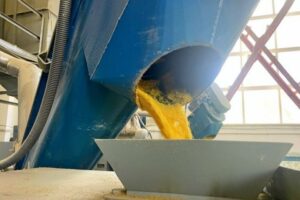
China’s MINTH Holdings Limited is investing 950 million euros in the construction of new production facilities for the automotive industry in Leskovec and Cuprija, the office of Leskovec Mayor Goran Cvetanovic said today.
The first phase of the project in Leskovec is expected to create 1,000 jobs, and the entire investment cycle is expected to last five years, Beta reports.
The Memorandum of Understanding was signed the day before at the Serbian Government building by the Mayor of Leskovec Goran Cvetanovic, the Minister of Economy Adriana Mesarovic and representatives of MINTH.
MINTH Holdings was founded in 1992 in China and is headquartered in Ningbo.
MINTH is one of the world’s top 100 auto component manufacturers and supplies products to leading automakers: BMW, Mercedes-Benz, VW Group, Tesla, Honda, Toyota, Nissan, Ford, etc.
The company specializes in the production of aluminum, plastic and composite body parts, trim panels, frames, roofs and interior parts. It has plants in China, the USA, Mexico, Germany, Thailand and, since 2018, in Serbia (Loznica).
MINTH is already active in Serbia, producing components for the world’s leading automakers. The new investment confirms the strengthening of industrial cooperation between Serbia and China in the field of high-tech production.
Why Serbia?
– Geographical advantage: Serbia is located at the crossroads of supply between the EU and Asia, making it a logistically convenient base.
– Duty-free access to the EU, EFTA, Turkey and EAEU markets under a number of agreements.
– Low costs: labor costs are lower than in Eastern Europe and Turkey.
– Stable investment cooperation with China: including the One Belt, One Road initiative and Serbia’s participation in the China-Central and Eastern Europe (17+1) format.
The importance of the project for Serbia
– Employment growth in southern Serbia, a region with traditionally high unemployment.
– Diversification of industry with a focus on high-tech production.
– Deepening Chinese presence in the economy – not only infrastructure, but also the real sector.
– Industrial transformation of Leskovets, which was historically a textile center but has lost industrial momentum in recent years.
Risks and challenges
– Dependence on one large investor at the regional level
– Possible dominance of China in strategic sectors, including through subsidies and tax preferences
– The need to ensure infrastructure readiness (electricity, water, roads), which will require efforts from local authorities and the state budget
The MINTH project is not just a local plant, but a strategic element in the supply chain of the global automotive industry. For Serbia, this is an opportunity to strengthen its position on the industrial map of Europe and grow from a subcontractor territory into a European production hub.
Source: https://t.me/relocationrs/1198

In the first half of 2025, DTEK Energy invested approximately UAH 4 billion in repairs and restoration of thermal power plants damaged by massive attacks, which is more than in the whole of 2024, when UAH 3.6 billion was invested, according to the DTEK Communications Department.
According to its release on Friday, during this year’s ongoing repair campaign, a significant amount of work has already been completed, although there is still a lot of work to be done this year and next.
“Our energy workers are restoring not only equipment, but also confidence in the continued reliable operation of thermal power generation and the power system as a whole.
Electricity is the foundation of everything, and we are doing everything possible to ensure that there is enough of it even in the most difficult moments,” commented Alexander Fomenko, CEO of DTEK Energy.
It is noted that since the beginning of the full-scale invasion of Ukraine, Russia has already struck DTEK’s thermal power plants 205 times. In total, last year, the energy infrastructure survived 13 large-scale attacks. Since February 2022, 56 power plant workers have been injured and four killed in shelling of DTEK Energy’s thermal power plants.
As reported, on the night of July 18, during the shelling of the Dnipropetrovsk region by Russian occupiers, a Ukrzaliznytsia train driver was killed and a DTEK locomotive driver was wounded.

Oleksandr Usyk won the undisputed world title by knocking out Daniel Dubois in the fifth round of their fight.
The fight was for the undisputed world heavyweight title according to the WBA, WBC, IBF, and WBO. It was a rematch: the boxers first met in the ring in August 2023, when Usyk knocked out Dubois in the ninth round. Usyk regained the IBF title, which he was forced to relinquish because he was unable to defend it at the time, and defended his championship in the other three versions.
“I want to thank all of Ukraine, all the guys who are defending our country. I received many messages from various units defending Ukraine,” Usyk said after the fight.

Ukraine currently has 22 million tons of oilseed processing capacity, and oil extraction plants (OEP) are still under construction, so processing volumes could reach 25 million tons in the near future, but it will not be easy to secure raw materials, said First Deputy Minister of Agrarian Policy and Food Taras Vysotsky.
“According to estimates, we have up to 22 million tons of capacity (OEZ – IF-U), and (OEZ – IF-U) are still under construction, which means there will be 22-25 million. Frankly speaking, it will not be easy to achieve such a volume (of raw materials for processing enterprises – IF-U).
Purely from an agronomic and agrotechnological point of view,” he commented at a meeting of the Trend&Hedge Club on the parliament’s decision to impose duties on soybean and rapeseed exports. Vysotsky explained that farmers would not be able to increase soybean production in a year by irrigating an additional 1 million hectares.
Such an investment pays off within 5-15 years and is a “long story.” Although such an expansion would significantly improve the situation for processors.
The deputy minister also does not see any prospects for significant potential for expanding areas and increasing yields for rapeseed.
“It may not be 3-3.5 million tons (Ministry of Agrarian Policy’s forecast for rapeseed production for the 2025 season – IF-U), it may be 5 million tons, as in 2022, or 4.8 million tons, as in 2023,” he stated, noting that it is difficult to talk about increasing production to 8-10 million tons per year, although there is land, plots, and all the necessary areas for cultivation.
According to Vysotsky, Ukrainian farmers can grow not 12 million tons of sunflower seeds in the 2025 season, but 15 million tons, with the maximum yield of the crop potentially reaching 25 million tons.
“This will be the ceiling, I declare, that can be grown within the controlled territories of Ukraine. Within the territories controlled by Ukraine, it is realistic to reach more than 23 million tons from the current 20.5 million tons (sunflower production – IF-U). If everything goes well, it could reach 25 million tons. But this is impossible in the coming years,” he explained.
The first deputy minister stressed that the processing industry has grown more than it can be supplied with raw materials in the period up to 2030.
“From a logical point of view, the seller’s market should remain in the country, but the issue of purchasing raw materials for processing should not be so (acute – IF-U),” he concluded.
As reported, at its meeting on July 16, the Verkhovna Rada supported draft law No. 13134 on the introduction of a 10% export duty on soybeans, colza seeds, and rapeseed (crushed and uncrushed) with an annual reduction of 1% until 2030, to a level of 5%.
According to Vysotsky, the Ministry of Agrarian Policy and Food forecasts oilseed production in the 2025 season at 20.5 million tons, including rapeseed at 3 million tons and soybeans at 5.7 million tons. The sunflower harvest in the southern regions is under threat due to drought and may be less than 13 million tons.

Between January and June 2025, medical supplies worth UAH 14.26 billion were purchased through the Prozorro Market electronic catalog.
According to the state-owned enterprise Medical Procurement of Ukraine (MPU), which administers the medical section of the catalog, this figure is UAH 4 billion, or 42.6%, more than in the first half of 2024.
According to the MZU, since the introduction of mandatory procurement through Prozorro Market, customers have saved UAH 2.05 billion, which is an average of 13% of the expected cost.
In addition, the percentage of deals closed in the e-catalog during this period was 79% compared to 70% in open tenders, and the average duration of the procedure was eight days compared to 16 days in open tenders.
The number of customers in January-June increased to 2,420, and the number of qualified suppliers to 5,294.
The Prozorro Market e-catalog is a marketplace where public customers can easily, efficiently, and economically purchase the goods they need, and suppliers can sell their products.

Businessman Vyacheslav Mishalov, who owns significant assets in several sectors, mainly concentrated in the Dnipro region, considers investments in agro-processing, which has export potential, to be promising and is interested in such projects, he said in an interview with the Interfax-Ukraine news agency.
“I am not involved in the agricultural sector. I’m not into farming, but I think processing is the next big thing in Ukraine. It’s already huge, but it’ll get even bigger because processing different crops is a never-ending process, it’s super high-tech, and Ukraine has a lot of room to process anything,” Mishalov said.
In his opinion, there is also a lot of room for craft products in this sector, so small businesses can also enter this market.
The businessman clarified that the absence of such objects in his portfolio is due to the fact that he has not yet come across good teams with the necessary experience in processing.
Mishalov also said that he remains interested in Dnipropres Steel, which he has left as an owner but has an option to buy the company under a “rather complex agreement.”
According to him, the company continues to pursue a very active and extensive modernization program, and the businessman himself cooperates with it as a consultant, advisor, independent member of the supervisory board, and seller of its products.
“This is an export-oriented business, and I really like it in the long run. Ukraine used to have very good schools and universities. And although this is no longer the case today, Ukraine is a very good place for individual metallurgy projects, ‘pearl buttons,’” Mishalov described his vision for the industry’s prospects.
Regarding the possibility of other investments, he noted that he has no plans for them at this time, with the exception of some local and specific ones.
“Today, we are completing all major investment decisions that were made earlier and are not starting any new ones yet. We need to wait a while — the risks are very high, and the horizon for stability is short. Given these factors, it is definitely not possible to make large investments,“ the businessman said, explaining his position. He added that he is currently completing an alternative energy project related to gas generation, which will be ready for announcement within the next three to four months. ”But again, these are necessary measures.
If we did not have our own large consumption, we probably would not have gone ahead with the gas generation project either, because the risks are high and the equipment is fantastically expensive,” Mishalov added.
According to him, there have been several attacks on his assets, the principle of which is unclear, but they are very precise, and each time the losses are measured in tens of millions of hryvnia.
Regarding the Lotus network of four gas stations in Dnipro and Novomoskovsk and the petroleum products trader Lotus Oil Trading, the businessman noted that these assets are currently illiquid due to unfavorable market conditions, where “profitability is good if it is zero,” and consumption is falling.
As for the news portal Informator, Mishalov claims that it is just a business.
“There was a time when it was a good business, and I had very successful experience selling similar assets. Today is probably not the best time. But that’s okay — we’ll wait and sell a little later.
In the long run, it’s a good business,” he said.
According to him, Informator is currently performing well, is active on social media, and is close to the top ten in terms of real audience.
Mishalov, who was secretary of the Dnipro City Council in 2016-2017, categorically denied plans to return to politics. “I don’t even know how much I would have to pay to go back there. It’s definitely not for me,” the businessman said.
As the businessman said in an interview, all his assets are already quite well structured and managed through the closed non-diversified venture corporate investment fund Fortress. Mishalov’s investments also include the financial company Ye Groshi, the provider Fregat, and an IT division.
The fund, in turn, is managed by the asset management company LLC “KUAA ”MPSS” from Dnipro, owned by Sergei Shishkin (50%), Igor Sukhodolsky (41%), and Olga Mukhina (9%).